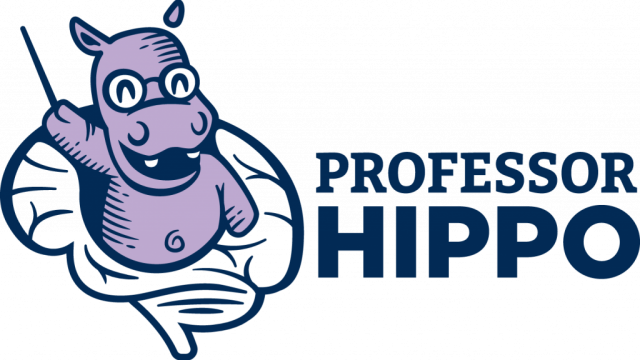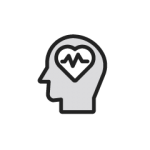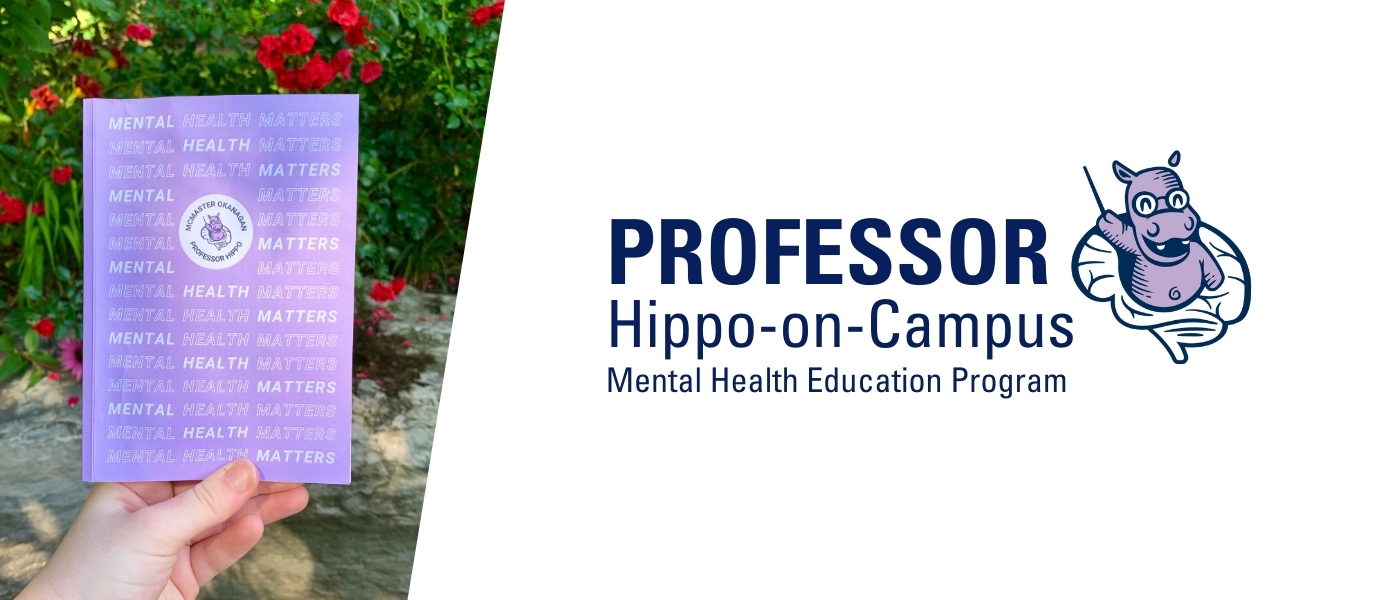Overview
Welcome to Professor Hippo-on-Campus!
The Professor Hippo-on-Campus Mental Health Education Program teaches faculty and staff at McMaster University about student mental health and how to support students in a way that suits their role. Participants also learn the Responding to Students in Distress or Difficulty (RSDD) protocol, which teaches how to recognize and reach out to students in distress or difficulty and connect students with appropriate resources and support.
Professor Hippo-on-Campus is free and available to all McMaster employees.
Expandable List
Demand for student mental health support and services is increasing on post-secondary campuses in North America. Campuses must develop systems and processes to ensure students receive the attention, support, and care that they need to thrive academically and personally. Building support and safety networks requires campus-wide engagement and culture shifts. At McMaster, we are committed to this endeavour.
Faculty and instructors (educators) and those who interact with, support, and supervise McMaster students in many other ways (navigators) are integral to this process. They should not be expected to be mental health experts or counsellors, but they are often ideally situated to recognize and respond to stressed and distressed students, start important conversations, and prevent unnecessary stress and distress. They must feel prepared and comfortable to address student needs in ways that are consistent with and appropriate to their roles.
The Professor Hippo-on-Campus program has been designed and tested to help accomplish these goals in an accessible and engaging format. You will learn what resources are available and what to do to support student mental health. Let’s start talking about the hippo in the room—mental health!
We are committed to continuous quality improvement and evaluation of the Professor Hippo-on-Campus program. We are also conducting and publishing research to study the effectiveness of our programs.
Research:
Four ways to participate:
- Core Program: 8 asynchronous, online modules through Avenue to Learn.
- Staff & Faculty Workshops: 3-hour in-person workshop. Note: The Core Program must be completed before the workshop.
- Graduate Student Program: Program designed specifically for graduate students, consisting of online modules, an online workshop and accompanying surveys. Note: You may participate as a study or non-study participant.
- Paid TA Training: 1-hour online module option for Mandatory TA Training.
Thank you to our partners and supporters


Core Program
How to Register for the Core Program
The McMaster Okanagan Office of Health & Well-being is pleased to announce that we are partnering with McMaster Continuing Education to deliver the Professor Hippo-on-Campus Core Program (8 online modules through Avenue to Learn).
If you are interested in taking this program, please fill out the eligibility form. Once you are approved, you will be sent a link to register for the program.
If you are already registered for a workshop and need urgent access to the modules, or have any other questions, please contact us at profhipp@mcmaster.ca
Expandable List
You will learn, along with Professor Hippo, about:
- Why Professor Hippo-on-Campus?
- Stress, Resilience and Coping
- Emotions, Mental Health and Mental Illness
- Creating a Mental Health Positive and Inclusive Learning Environment
- Communicating with Stressed and Distressed Learners
- Recognizing and Responding to Students in Distress or Difficulty
- Accommodations: Context and Process
- Mental Health Matters for Educators and Navigators
The Professor Hippo-on-Campus e-learning modules run for approximately 3 hours total. Each module is about 10-30 minutes in length. The modules are best done gradually (e.g., 1-2 modules per day). Each module has a “resume” feature so if you do not finish a module at one time, you will be prompted to continue where you left off when you come back to the module.
- Educators (those teaching and supervising students academically):
- Sessional instructors
- Faculty
- Research Assistants
- Postdoctoral Fellows
- Clinician Educators
- Residents
- Fellows
- Navigators (those interacting with, supporting and supervising students in other ways):
- Administrators
- Full-time staff
- Part-time staff
- Contract staff
- All Employees of McMaster (those who have access to Mosaic can register)
- Teaching Assistants (TAs) may take the core program, but are strongly encouraged to complete a separate 1-hour module specifically designed for TAs. Visit the TA Training tab to learn more.
Participants who complete all of the following steps to certification will receive a “Certificate of Attendance” for completing the Professor Hippo-on-Campus program.
| Steps to Completion and Certification | Timeline |
| 1. Fill out the eligibility form here. You will receive an email with further details. | Complete anytime. Allow up to 7 business days to receive the information. |
| 2. Enrol in the term course on Mosaic, using the self-enrolment link that you will receive in your email. | Anytime within the current term. |
| 3. Follow the steps listed in the course announcement on A2L, and complete the consent form. We kindly ask that you also complete the Pre-Survey, so we can continuously improve our program | Within 2 weeks (after registration) |
| 4. As soon as you complete the Pre-Survey, you will be given a code and can start accessing the 8 modules in Avenue to Learn. The full content takes about 3 hours, but you do not need to do all at once. You must complete the “Module Completion Quiz” (takes 1 minute) when you’ve finished the modules. | Before the end of the term |
| 5. Complete the Post-Survey, after the quiz and module completion. The link to this survey will be sent to your email by the program within 2 business days of completion. | Within 4 weeks after completing the “Module Completion Quiz”. |
| 6. A digital Certificate of Attendance will be issued by McMaster Continuing Education at the end of each term, and you will receive it to your email. | About 10 days after the end of current term. |
This training will ask you to:
- Reflect on what you know about mental health
- Gain confidence in supporting students or others in your life
- Apply the Responding to Students in Distress and Difficulty (RSDD) protocol
- Direct students to the appropriate resources on campus or in the community
- Take pro-active measures in building a mental health-inclusive classroom
- Consider how you can work with others to address the “hippo in the room” (i.e. decrease stigma around mental health)
In addition to all of the practical skills and knowledge you will:
- Receive a Digital Certificate of Attendance and can say you are a certified Professor Hippo-on-Campus participant
- Be able to request a printable sign or sticker which lets others know you care about student mental health. Simply drop us an email at profhipp@mcmaster.ca, and we’ll coordinate a convenient pickup arrangement for you.
- Be eligible and can be contacted about future educational or training opportunities offered by Professor Hippo-on-Campus at McMaster
- Retain ongoing open access to the most up-to-date set of modules and all of the attached resources on Avenue to Learn, which you can access 24/7/365
- Be able to have your name shared with McMaster leadership and the McMaster community (optional) to let them know you are a student mental health supporter
This is a ‘club’ you can join and a certificate you can receive for free!
Staff & Faculty Workshops
Overview
To benefit from this workshop, you must first complete the Professor Hippo-on-Campus Core Program (8 modules), which takes around 3 hours on Avenue to Learn and is best done gradually over days to weeks. This workshop builds on and applies the online module content, which will not be reviewed in depth in the workshop to allow for more interaction and case discussion.
To learn more about how to register for the online module, please refer to the Core Program tab.
Workshops are facilitated by Dr. Catharine Munn, Creator & Lead, Professor Hippo-on-Campus Program, and Advisor to the Provost (Special Projects, Mental Health). For further information or questions, please contact profhipp@mcmaster.ca
Register for Upcoming Workshops
Please note that additional dates will be added throughout the academic year for other groups. If you are interested in attending a workshop but none are available for your employee group or faculty, please email us at profhipp@mcmaster.ca to learn what other opportunities are available.
Please note: The following workshops are open to staff and faculty members from each respective faculty. All individual faculty workshops will be booked through each Faculty Dean or Designate. Please contact your Faculty Dean or Designate if you’re interested in participating.
Faculty of BusinessMarch 28, 2024 from 9:30 AM to 12:30 PM Location: Ron Joyce Centre (Room 364) Contact person – Khadijeh Rakie (rakiek@mcmaster.ca) April 11, 2024 from 9:30 AM to 12:30 PM Location: Michael DeGroote Centre for Learning and Discovery (Room 3002) Contact person – Khadijeh Rakie (rakiek@mcmaster.ca) |
Faculty of HumanitiesTBD Contact person – Sebastian Chong (chongs6@mcmaster.ca) |
Please note: The following workshops are open to faculty and instructors (not TAs or RAs) who teach or supervise students as their primary role.
There are no sessions currently scheduled. Please continue to monitor for updates.
Please note: The following workshops are open to anyone who is part of the Management Group (TMG) and/or interacts with students in their roles and/or acts as a supervisor or leader to employees in student-facing roles.
There are no sessions currently scheduled. Please continue to monitor for updates.
Please note: The following workshops are open to all employees at McMaster, apart from faculty members, who frequently interact with students in their role in some capacity.
There are no sessions currently scheduled. Please continue to monitor for updates.
There are no sessions currently scheduled. Please continue to monitor for updates.
Graduate Student Program
Overview
The Professor Hippo-On-Campus Graduate Student Mental Health Education Program is designed specifically for graduate students. This program is an extension of the Professor Hippo-on-Campus Mental Health Education Program for faculty and staff, tailored to meet graduate student needs.
The program has received funding from the McCall MacBain Foundation, and can train up to 200 graduate students in the full program (module and workshop) with incentives. We are currently recruiting McMaster graduate students to participate in the program this year and in an optional research study to assess the impact of this program. Graduate students can receive up to $175 in incentives for participation in the online module, workshop, and completing surveys (HiREB Project #16630).
Many graduate students oversee undergraduate students in TA, supervisory, or research assistantship positions, interact with many graduate student peers, and can experience distress or mental health difficulties themselves during graduate school. The program will help you, graduate students, build knowledge to approach and address situations that arise and understand the resources available at McMaster.
The program is available to all graduate students, and there are workshop spots allocated to each of the six Faculties based on the number of graduate students in each faculty to ensure fairness. An unlimited number of students can access the online modules but limited numbers will receive incentives for completing the program and limited numbers can participate in the online, synchronous, participatory workshop.
The online training modules are 70-minutes in duration and cover topics such as:
- Contemporary views of mental health
- Creating inclusive and mental health-positive environments in keeping with your roles during graduate school
- Communicating with and responding to students and peers in distress and recommending appropriate resources
This training equips graduate students with essential mental health literacy and actionable skills required to be successful as a figure of support that others in the academic environment may look to in times of need.
Training & Study Options
The main purpose of the online module is to help you, as a graduate student, develop mental health literacy to support undergraduate students and peers, and protect your own mental health.
You can choose to complete the online module only, or to be part of the research study that will evaluate the effectiveness of this program. Participants of the study will be compensated to a maximum of $175 for participation in the online modules, workshop, and corresponding surveys.
View the steps of the study and corresponding gift card incentives below.
- Complete a Pre-Survey before the educational modules – $5 (approximately 15-20 mins). You will have up to 7 days to complete the pre-survey after it is sent to you.
- View the online educational modules on Avenue to Learn and answer knowledge questions (approximately 70 minutes in total). You will have up to10 days to complete the modules and knowledge questions after you are given access.
- Complete the Module Post-Survey, including knowledge test – $15 (approximately 15-20 mins). You will have up to 7 days to complete the post-survey after it is sent to you.
- Participate* in an online interactive Workshop – $25 (2.5 hours)
- Complete the Workshop Post-Survey – $50 (approximately 15-20 mins). You will have up to 10 days to complete the post-workshop survey after it is sent to you.
- Complete the follow-up 3-Month Post-Workshop Survey after the workshop – $50 (approximately 15-20 mins). You will have up to 10 days to complete this follow-up survey after it is sent to you.

Note: If you complete all steps of the study process (1 through 6), you will be rewarded with a bonus gift card payment of $30. Incentives will be sent via email on a rolling basis as each step is completed, within 5 business days of completion. Limited time slots are available for workshops, and you must participate in the workshop to receive incentives #4, 5, and the bonus gift card. If you are unable to participate in a workshop, you will still receive incentives #1, 2, 3, and will be provided an opportunity to complete the post-survey with incentive (#6).

Register
To participate in the study or register for the online module, please fill out the Microsoft Form.
If you choose to participate in the study, you will receive further information regarding next steps.
Please note: To register you must be a McMaster Graduate Student and be enrolled in an eligible program. Failure to meet this registration requirement will result in termination from the program without compensation.
Graduate Student Workshops
These workshops are designed to be completed after taking the Professor Hippo-on-Campus Graduate Student course, which will be available on Avenue 2 Learn. Please note: All workshops will be held online. You will be able to choose a workshop date after completing the post-module survey step of the study.
February, 2024
|
March, 2024
|
April, 2024
|
May, 2024
|
Frequently Asked Questions
Find answers to some of our most frequently asked questions. If you have any other questions or concerns, feel free to reach out to us at gshippo@mcmaster.ca
Many graduate students oversee undergraduate students in TA, supervisory, or research assistant positions, interact with many graduate student peers, and can experience distress or mental health difficulties themselves during graduate school. The intent of this program is to help graduate students build their mental health literacy, that is their knowledge, skills, attitudes and confidence, to support themselves and other students in distress and difficulty and to build more inclusive and mental health-positive learning and teaching environments at McMaster.
This current graduate program has been developed and tested over 2 years in a pilot project. Dr. Catharine Munn and an occupational therapist have developed the content with input from students, faculty and staff; they and other trained healthcare professionals will be leading the workshops.
We have evaluated this program and our faculty and staff program in depth, with consideration for improved knowledge, skills and confidence, satisfaction, impact and safety. Please contact us if you’d like more information on this process or results, which have very high satisfaction rates!
Additionally, McMaster School of Graduate Studies (SGS) is supportive of this program and has contributed to its development and promotion.

These workshops are open to all graduate students, and there are spots allocated to each of the six faculties based on the numbers of graduate students in each faculty, to ensure fair distribution. Our goal is to train 200 graduate students in the full program in the next 6 months.
While having some shared content, this is distinct from the TA training that we developed and you may be aware of, an optional online module (with no workshops) that can be selected by TAs within their 5 hours of compensated training offered each semester.



Paid TA Training
Training Option
All McMaster TAs are required to complete 5 hours of mandatory training, including 2 hours of training they can choose from a list of electives. One of the elective choices is a variation of the Professor Hippo-on-Campus program, called Mental Health in the Classroom.
In a one-hour module, you will:
- Learn more about mental health and accommodations to help you and your students in your role as a TA
- Recognize and communicate with students in distress
- Be a part of the Professor Hippo-on-Campus community, which consists of staff, faculty, and other TAs
Interested?
Please select “Mental Health in the Classroom” through the mandatory TA training offered by MacPherson on Avenue to Learn. If you have any questions, please reach out to us at profhipp@mcmaster.ca
Are you interested in attending a future synchronous workshop where you will learn to apply the knowledge from this module? Email us for more information.



Resources
Information Box Group

Mental Health Resources Find Resources
Find mental health resources for students, faculty, and staff. Virtual, on-campus, and community resources are available.
Mental Health Toolkits Explore Toolkits
We have created toolkits to help staff, faculty, and student leaders develop skills and strategies to promote mental health positive environments.

